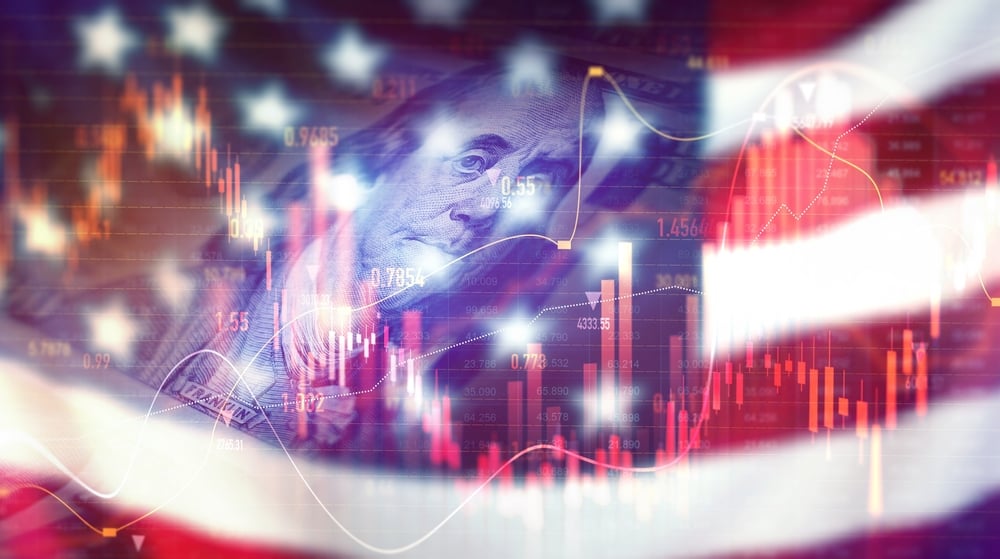Investors have embraced a wave of optimism following Donald Trump’s presidential election win, sending U.S. stocks to record heights. The Dow Jones Industrial Average closed above 44,000 for the first time, and the S&P 500 enjoyed its best week of the year, marking its third-strongest post-election week since 1928. This rally was driven by hopes for tax cuts, deregulation, and pro-business policies under the new administration.
Big banks have seen their stocks spike, anticipating a lighter regulatory environment, while private prison companies surged on expectations of stricter immigration policies. The crypto market also reacted positively, with Trump shifting from a bitcoin skeptic to a supporter.
Bond Market Concerns and Rising Yields
While stock market investors are celebrating, the bond market is signaling concern over Trump’s economic policies. The prospect of significant tax cuts and broad tariffs has sparked fears of higher deficits and inflation. These worries pushed U.S. Treasuries into a selloff before Election Day, which continued as the scope of Trump’s victory became clear. Yields on the 10-year Treasury note have risen by 0.4 percentage points this year, largely attributed to election dynamics, as per Stephanie Roth, chief economist at Wolfe Research.
David Kotok, co-founder and chief investment officer at Cumberland Advisors, noted, “The stock market loved the election outcome. But there is nervousness in the bond market. It’s more worried about the size of deficits and the possibility of inflationary tariffs.”
Economic Outlook and Fiscal Policy Expectations
Investors and analysts are weighing the implications of Trump’s proposed economic measures, which include extending the 2017 tax cuts, slashing corporate tax rates to 15%, and introducing various other tax breaks. According to the Committee for a Responsible Federal Budget, these policies could add $7.75 trillion to the national debt over the next decade, compared to $3.95 trillion under Vice President Kamala Harris’s potential administration.
Jeff Buchbinder, chief equity strategist at LPL Financial, expressed concern over fiscal discipline, writing, “The lack of fiscal discipline is a concern,” while suggesting that rates may not spike further in the short term.
Inflation Risks and Tariff Implications
Trump’s plans have also raised alarms over potential inflation. His proposed tariffs on $3 trillion worth of U.S. imports and mass deportation policies, which could disrupt labor-reliant sectors like agriculture and housing, are seen as inflationary. Nearly 68% of economists surveyed by The Wall Street Journal believe that inflation will rise more quickly under Trump’s administration than under Harris’s.
Kotok highlighted that while Trump has claimed foreign entities would bear the cost of tariffs, in reality, the financial burden would fall on American consumers. “The tariff issue is a concern because it’s a sales tax,” Kotok said. “Tariffs are done by executive order. Congress gave the authority to the president long ago. They’re not going to take it back and no president would give it up without a fight.”
The Fed and Rising Borrowing Costs
Despite the Federal Reserve’s efforts to cut rates, bond yields continue to climb, leading to increased borrowing costs for consumers. Mortgage rates, for instance, have risen to an average of 6.79% as of early November, up from 6.08% following the Fed’s significant rate cut in September, according to Freddie Mac. This jump in rates could cool down consumer spending and make credit more expensive for small businesses.
Stephanie Roth cautioned, “Higher rates would become problematic at some point. I don’t think we’re there yet,” but acknowledged that sustained rate increases could strain the economy.
Investor Sentiment and Future Market Moves
For now, stock investors remain unfazed by the rising bond yields and potential inflationary pressures. Ed Yardeni, president of Yardeni Research, noted the jubilant market sentiment: “Animal spirits are back. The stock market jumped for joy that the election results were definitive, thus averting a contested election. Stock investors are also thrilled by the regime change to a more pro-business administration promoting tax cuts and deregulation.”
Yardeni suggested that faster economic growth could bolster federal revenues, allowing Washington to manage the growing debt burden. However, Stephanie Roth warned that the market’s current focus on positives could shift if inflation and tariffs start impacting economic stability. “The market isn’t focused yet on tariffs, which are quite negative. The market is pricing all the positives, perhaps too much so,” she said.
Conclusion: The Dual-Edged Sword of Higher Rates
While the initial reaction to Trump’s win has been a bullish push in the stock market, rising bond yields pose potential risks. Higher borrowing costs could eventually slow down economic growth and make financing the national debt more expensive, an issue of growing concern as U.S. debt levels rise by $1 trillion approximately every 100 days. The sustainability of the current market rally hinges on how these competing forces—economic optimism, fiscal deficits, and inflation—play out in the months ahead.




















